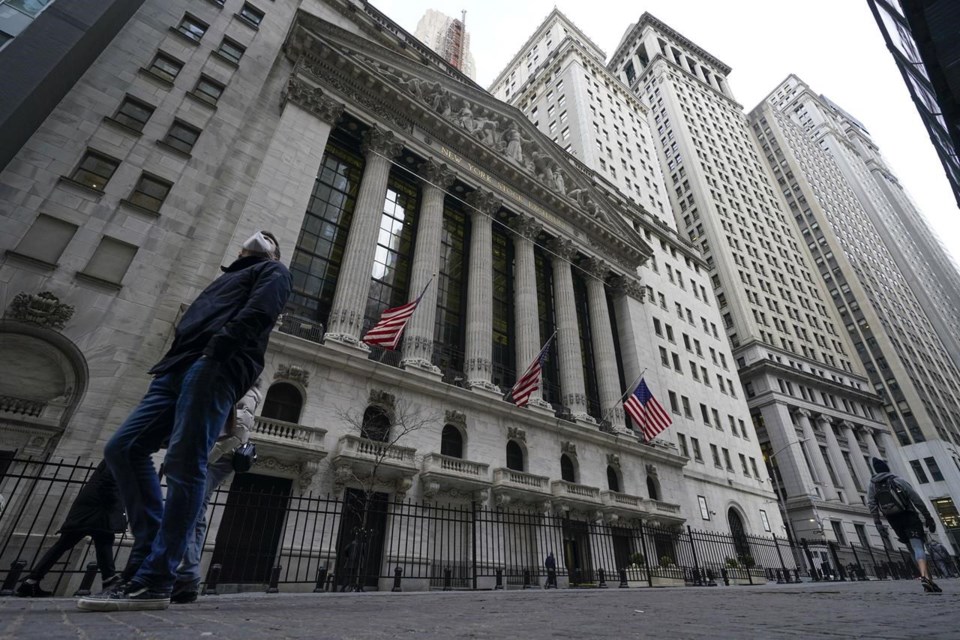NEW YORK — Wall Street capped a choppy week of trading with a broad slide for stocks Friday, giving the S&P 500 its second losing week in a row.
The benchmark index fell 1.2%, its first loss in three days. The Dow Jones Industrial Average dropped 0.8% and the Nasdaq composite gave back 1.6%.
U.S. automaker stocks proved to be resilient after members of the United Auto Workers union walked off the job at several plants overnight. Ford slipped 0.1% and General Motors rose 0.9%. Shares in Stellantis gained 1.9% in trading on the Milan Stock Exchange in Italy.
The market posted some gains earlier this week following several healthy indicators on the economy. Wall Street has been watching economic updates ahead of the Federal Reserve's interest rate policy meeting next week. The central bank is expected to hold interest rates steady after spending much of the last two years pushing rates higher in its bid to tame inflation.
Boosting market sentiment this week was a report Thursday that said U.S. shoppers spent more at retailers last month than economists expected. A separate report Thursday morning said fewer workers applied for unemployment benefits last week than expected.
A third report on Thursday said prices getting paid at the wholesale level rose more last month than economists expected. That could be a discouraging signal for households if the higher-than-expected inflation gets passed on to shoppers at the consumer level.
Meanwhile, a closely-watched survey from the University of Michigan showed consumer sentiment slipped a bit in September. The latest reading, though, shows that overall sentiment remains strong. It also said consumers lowered their expectations for inflation in the year ahead to 3.1%, which is the lowest reading since March 2021.
“Things were fairly in line from a data perspective,” said Matthew Stucky, senior portfolio manager at Northwestern Mutual Wealth Management. “Really, the market is laser-focused on what’s going to impact Federal Reserve activity.”
The central bank raised rates aggressively through 2022 and 2023 in an effort to tame inflation, but it maintained interest rate levels at its last meeting. Inflation has generally been easing back to the central bank’s target of 2%.
“A lot of the optimism about the Fed pausing is priced into markets,” Stucky said.
Inflation at the consumer level edged higher than expected in August, but high gasoline prices were the biggest driver. Oil prices have been climbing over the summer after Saudi Arabia decided to maintain production cuts. That raised concerns about gasoline prices rising and stoking inflation.
Investors are overwhelmingly betting that the Fed will hold interest rates steady when it closes a two-day meeting on Wednesday. They also expect the central bank could hold rates steady for the rest of the year. The Fed has said it remains willing to continue raising rates if it seems necessary to continue fighting inflation.
All the sectors in the S&P 500 ended in the red Friday, with technology stocks the biggest drag on the index. Microsoft fell 2.5% and chipmaker Nvidia slid 3.7%.
Retailers also weighed down the index. Amazon fell 3%, Home Depot dropped 2.5% and Lowe’s Co. slumped 4.7%.
All told, the S&P 500 lost 54.78 points to 4,450.32. It's up just under 16% so far this year.
The Dow fell 288.87 points to 34,618.24. The Nasdaq, which is heavily weighted with technology stocks, slid 217.72 points to 13,708.33.
Bond yields gained ground. The yield on the 10-year Treasury, which influences interest rates on mortgages and other loans, rose to 4.33% from 4.29% late Thursday. The yield on the 2-year Treasury held steady at 5.02%.
___
Yuri Kageyama and Matt Ott contributed to this report.
Damian J. Troise And Alex Veiga, The Associated Press



